Members of Poetry Club express what poetry means to them
By Bella Bozied
In 1996, the Academy of American Poets established National Poetry Month to commemorate the importance poets hold in everyday life and to demonstrate “that poetry matters,” according to the organization’s website.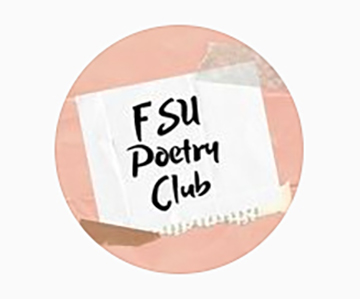
Creative types can focus on different goals when celebrating the month: writing poetry, reading poems, telling more people about the craft, and more.
The beauty of the month is the variety the time holds. Those 30 days highlight the strides the art form has made and continues to make as well as show the writing form’s accessibility, how anyone can, and should, write poetry.
With another Poetry Month gone by, several members of Florida State University's Poetry Club reflect on how poetry affects their lives.

Claire Cappel
A second-year student majoring in psychology and social work, Cappel had two of her poems presented in showcases put on by Starting Right, Now, a nonprofit agency that helps and supports homeless, unaccompanied youth. The pieces center on her home life and what she sees love as. Beginning in Fall 2022, Cappel will move from member to treasurer of the Poetry Club.
What is your relationship with poetry?
I started writing poetry in 2020 for a class I was taking outside of school. I had never really written poetry prior to that, but I’ve always loved to write ever since I was a kid. Poetry is a creative outlet I use to express my thoughts and feelings, and I find it to be very helpful when I want to convey a message that I’d rather not say blatantly outright.
I like to use extended metaphors and rhyme schemes throughout my poems to create a sense of connectedness. It also allows me to communicate with others and give them the chance to understand and possibly relate to the way I think.
How does poetry stick out to you compared to short stories and other writing mediums?
Compared to other mediums of writing, poetry is a lot more interpretive. It’s formulated in a way that compels the readers to think for themselves about the story being conveyed by the poet. It forces the wheels to turn in their brain so they can truly understand what was being written.
Who is your favorite poet?
I’m not sure that I have a favorite poetry artist as of yet, but I do have quite a few copies of Courtney Peppernell’s books.
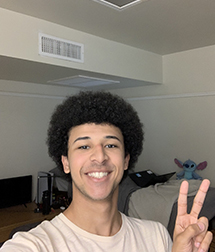
Rafael Cardoso
Cardoso has been a member of the Poetry Club since the first semester of his first year at FSU. He is now a second-year student, majoring in computer science, with a minor in English. He has been writing poetry for about three-and-a half-years. Initially, he disliked the practice until he watched a space documentary in a high school physics class, which compelled him to start writing.
What is your relationship with poetry?
My relationship with poetry is like talking to a therapist and an artist at the same time.
The therapy of being able to put the experiences I have had and yet to have into openly descriptive words brings me relief or resolution that I would not find anywhere else.
The artistry of these words is how they can paint images or pull sounds or carve miniature stories that can inspire and help people realize maybe some things about the world or themselves. Like a person staring at a painting and admiring the technique but still coming to tears at its symbolism and theme. It’s a conversation: the world, the reader, and the poet all bouncing stuff off one another.
How does poetry stick out to you compared to short stories and other writing mediums?
The first and most immediate thing is how poetry can encompass so much more than other medians. For example, a short story is limited to conventions such as the hero’s story or a rise, a conflict and resolution, etc. Poetry can literally be just a title with one word, even one letter. I don’t know if that would make a very profound poem but it would be one.
The next is how poetry lends itself so incredibly well to figurative language, especially metaphor and rhyming. You can cram so much figurative language in your own style that it’s liberating compared to something like a constrained essay. That’s how poetry sticks out: freedom. There is no other median that allows you to be as wildly textbook or as structurally crazy as poetry. A liberation of the verbal and written shackles so to speak.
Who is your favorite poet?
That’s a tricky thing because, ironically, I barely read poetry on my own time, which is something I need to work on. I replace that with listening to a copious amount of music and taking inspiration from music artists.
However, if I had to pick a poet that catches my eye or always delivers a line that cuts right through me, it’s Rumi. His ability to somehow always leave an impact on my soul through his 11th-century poetry is something wondrously whimsical.
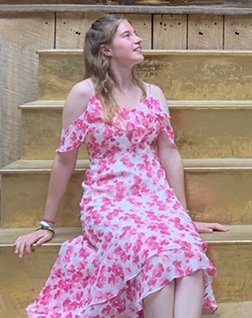
Jenna Prunty
Serving as the Poetry Club president for the past two years, Prunty is a third-year student, majoring in international affairs, with a minor in Arabic. She holds two certificates, one in Global Citizenship and the second in U.S. National Intelligence Studies. Prunty’s favorite of her published pieces is “Riding the Border,” which she put a lot of work into, creating a story that is rich in imagery and language.
What is your relationship with poetry?
I started writing in 7th grade, but I didn’t really start exploring it until college. I joined the Poetry Club during Covid, and at the end of my first year at FSU, I was the last remaining member because everyone else was going to graduate. I decided to resurrect the club because I had grown so much through it, and I loved the community the original members created.
From there, I started taking initiative to better my work, and so far, I have been published three times. I got published the first time before I had ever taken a poetry class, so English Professor David Kirby dubbed me the “backdoor poet,” as I had my success without any kind of mentorship.
How does poetry stick out to you compared to short stories and other writing mediums?
It allows you to fully express what you mean through emotional imagery. You can’t describe something and show that to a reader in other mediums that’s telling them how they should feel. Poetry lets you show the reader the feelings associated with something.
Who is your favorite poet?
William Bortz is my favorite; he has great mastery of language.
Read English alumna Rachel Loring's article about the club's return to in-person meetings at the beginning of the Fall 2021 semester, under Prunty's leadership as president.
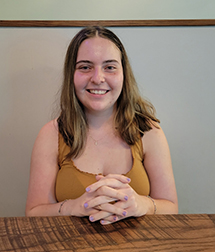
Taylor Tieder
Tieder is a third-year student, majoring in English-Creative Writing, with a minor in film. She wrote her first serious poem in sixth grade but did not start consistently writing poetry until high school.
What is your relationship with poetry?
In regards to school, I've taken two poetry workshops at FSU, and I've been a member of FSU's Poetry Club for a few semesters. Otherwise, I view poetry as an outlet where I can express my creativity while also entertaining the reader and sparking an impact.
One workshop was with English Professor David Kirby and the other one was with Senior Lecturer in English Barbara Hamby. I wanted to do these workshops because it is really helpful to receive feedback from a professor and peers. They were also insightful because I was exposed to new forms of poetry and writers.
How does poetry stick out to you compared to short stories and other writing mediums?
Sometimes poems can be like condensed short stories, especially narrative poems. However, I think in poetry the writer has a lot more room to play with space and form.
For example, in my classes I've seen poems in the shape of a lightning bolt and a bee which is something that isn't found in fiction (at least to my knowledge). In general, I feel like there are fewer rules in poetry than fiction; some poems don't have any punctuation or are just a collage of abstract images. Meanwhile, effective short stories typically require characters, plot, setting, etc.”
Who is your favorite poet?
That's hard to say. In general, I love poems with creative images and voices. Typically, I enjoy poems that deal with feminism, nature, or our place in the universe.
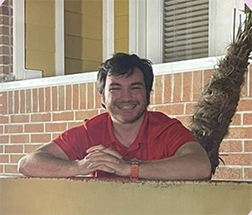
Maximo Fernandez
Fernandez is a sophomore who is double majoring in classical civilizations and Russian language/culture. As a member of FSU’s Poetry Club since his the fall semester of his first year, he says he gets over writer’s block by asking his friends for poem topics.
What is your relationship with poetry? Very new, to be honest. I—like I'd say most of my peers relate to—had never really been too interested in poetry growing up. However, now that I have begun writing, I'd say I've developed a therapeutic, calming relationship with poetry.
Sometimes the writer's block can make it difficult to do, and sometimes I get frustrated when I feel like I'm stuck on the same topic for a bunch of poems, but that's natural with a creative outlet.
How does poetry stick out to you compared to short stories and other writing mediums?
I can do a lot with a little, or a little with a lot, which is to say I find it to be the most versatile kind of writing.
Short stories and novels and essays and whatnot are also able to be variable, but in ways that are so different. You can write a book, for example, with no punctuation, but it makes a lot more sense to do so with a poem.
Who is your favorite poet?
I'm a big fan of Walt Whitman, Alexander Pushkin, and Ovid, though if I must choose one, definitely Pushkin.
Although the month of April has come to an end, there is no reason to stop celebrating your creativity. Literacy celebration months, campaigns, and movements are to encourage everyone to artistically push themselves. So, feel free to let your poetic side take a seat in the driver’s side, even after April.
Bella Bozied is a double major in English-Editing, Writing, and Media as well as Information, Communication, and Technology.
Follow the English department on Instagram @fsuenglish; on Facebook facebook.com/fsuenglishdepartment/; and Twitter, @fsu_englishdept
